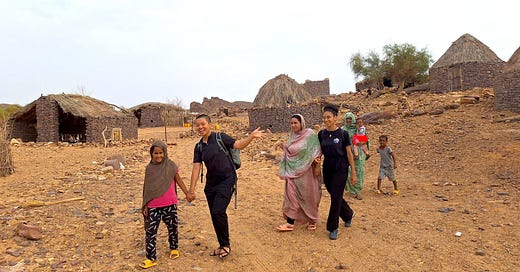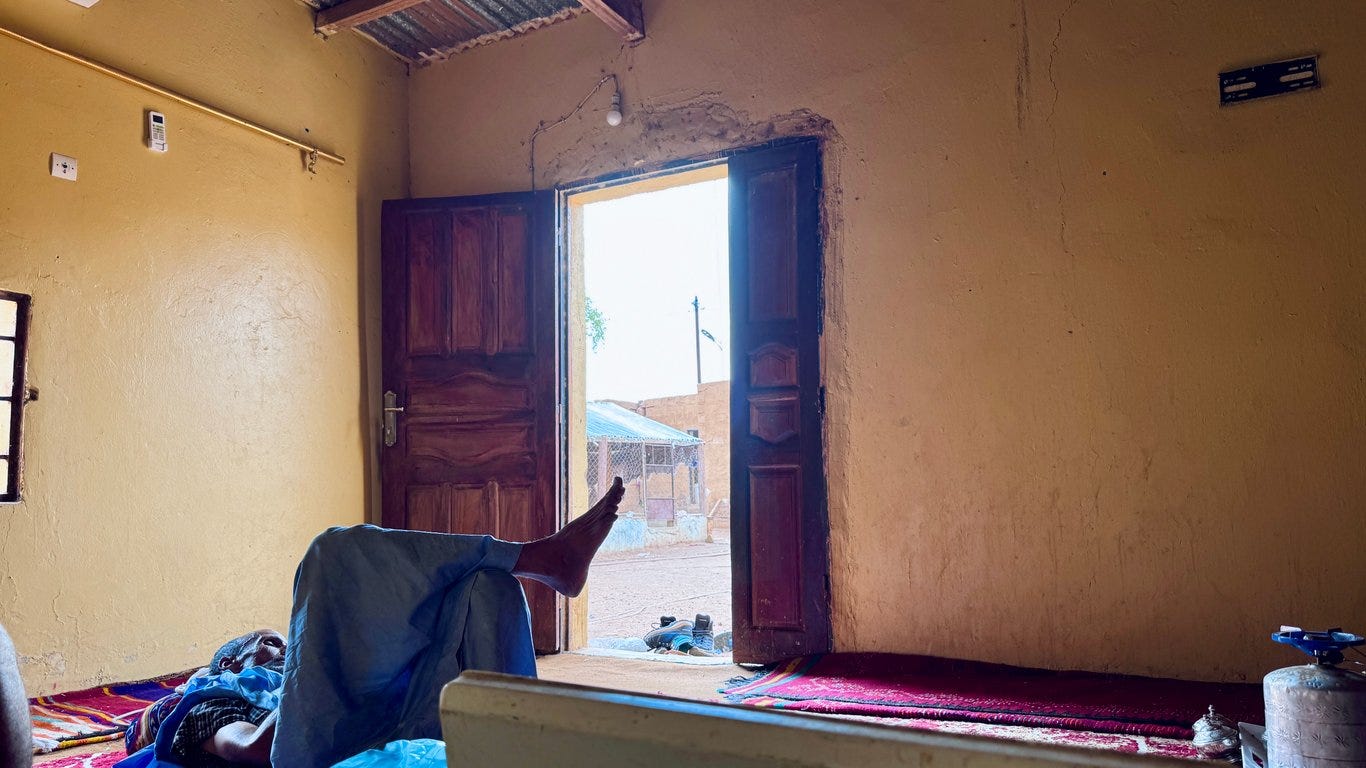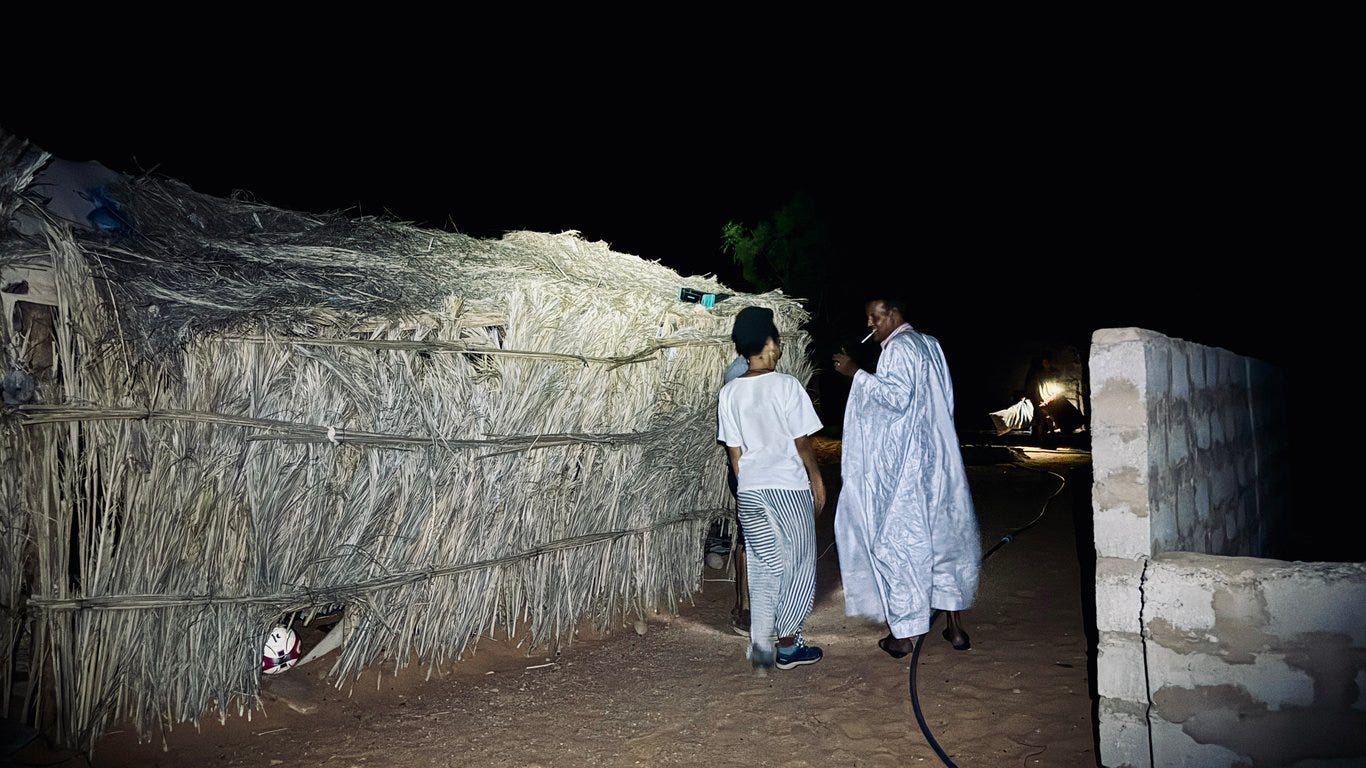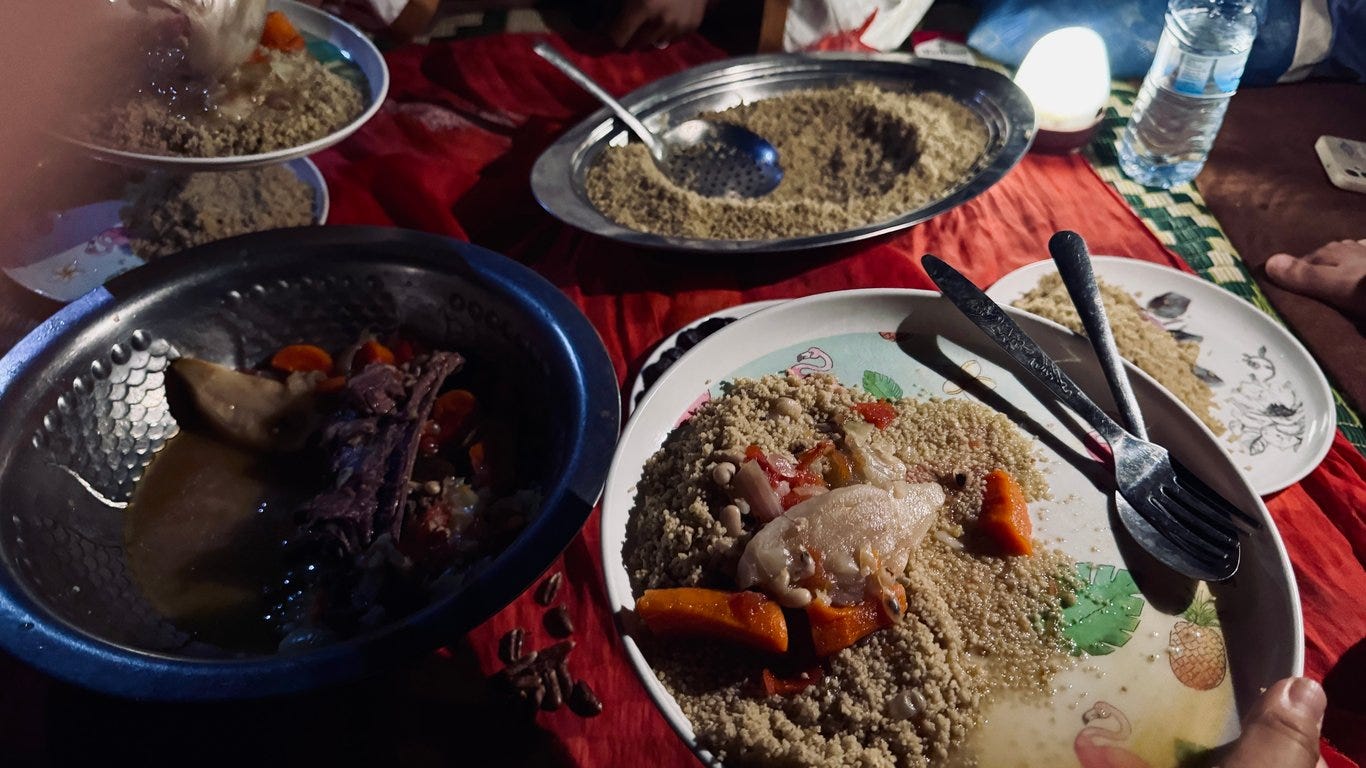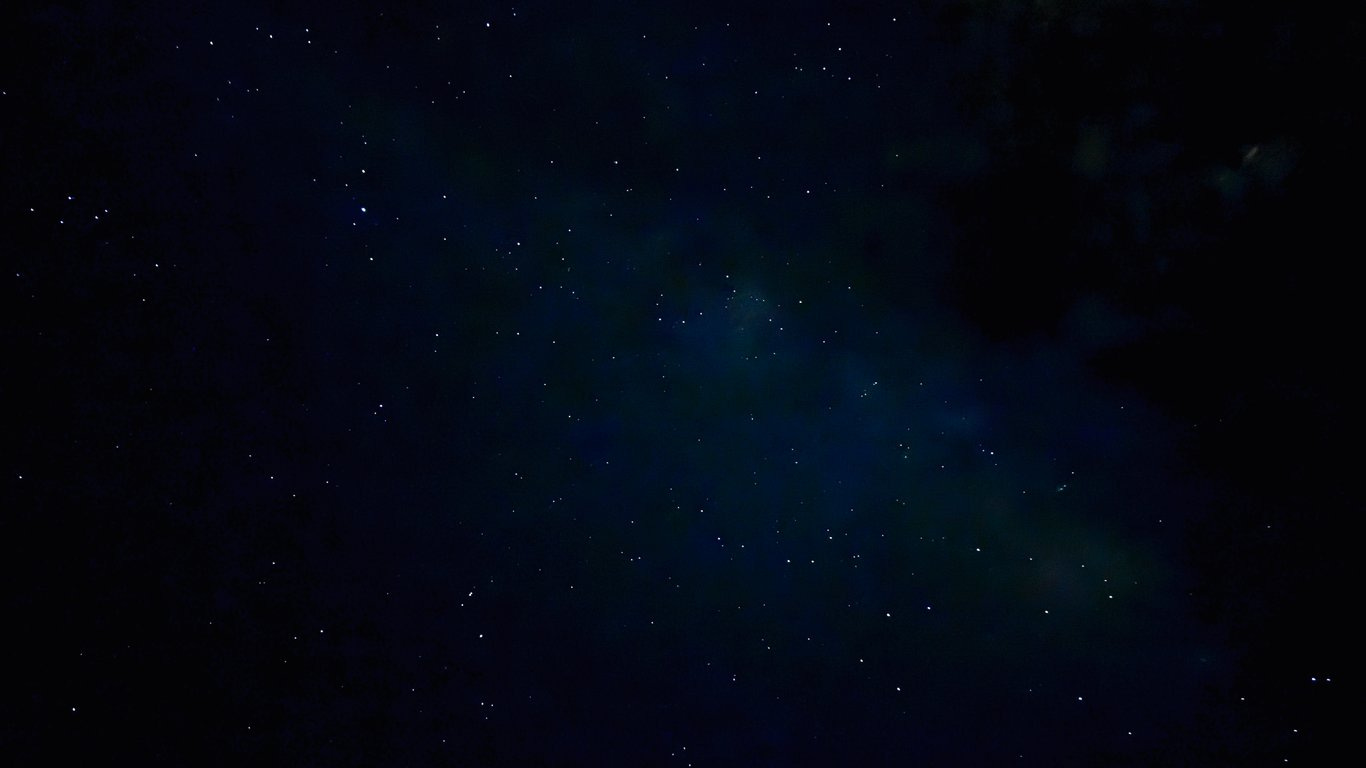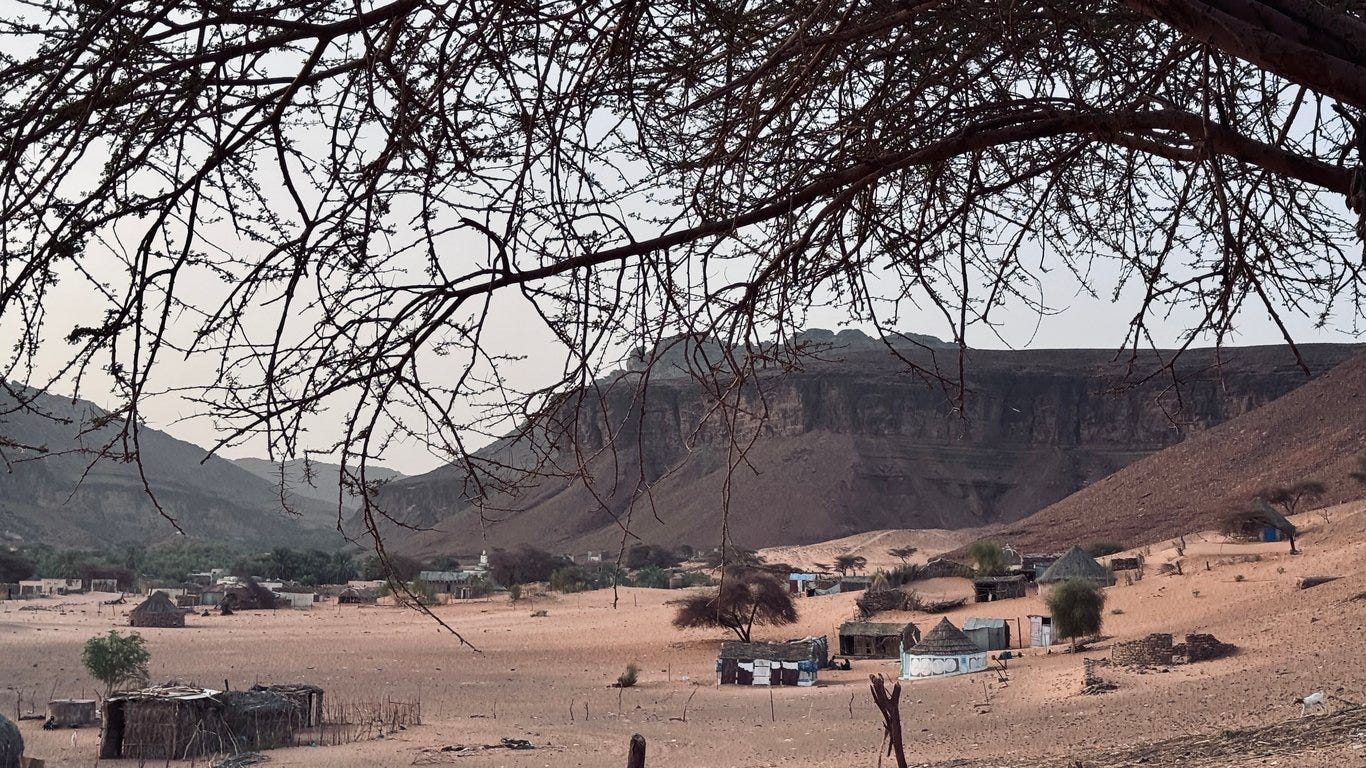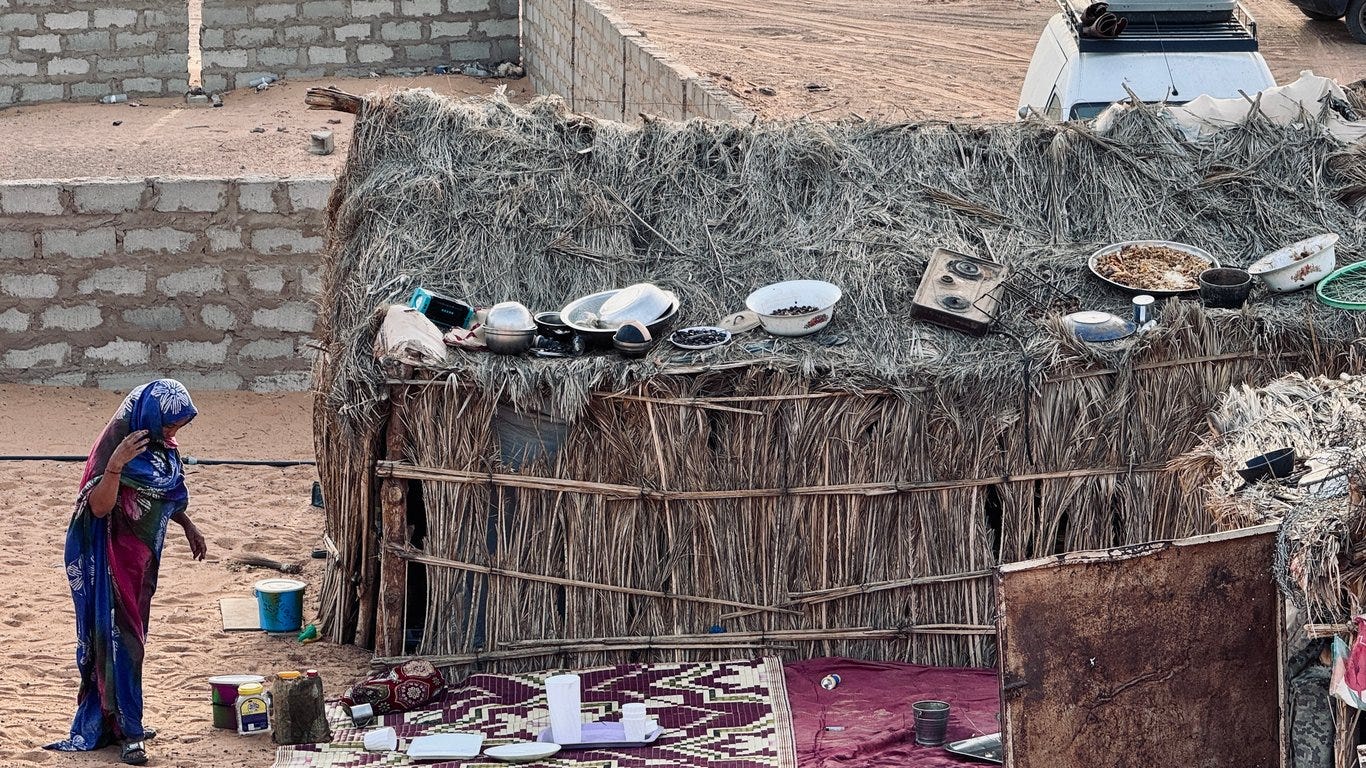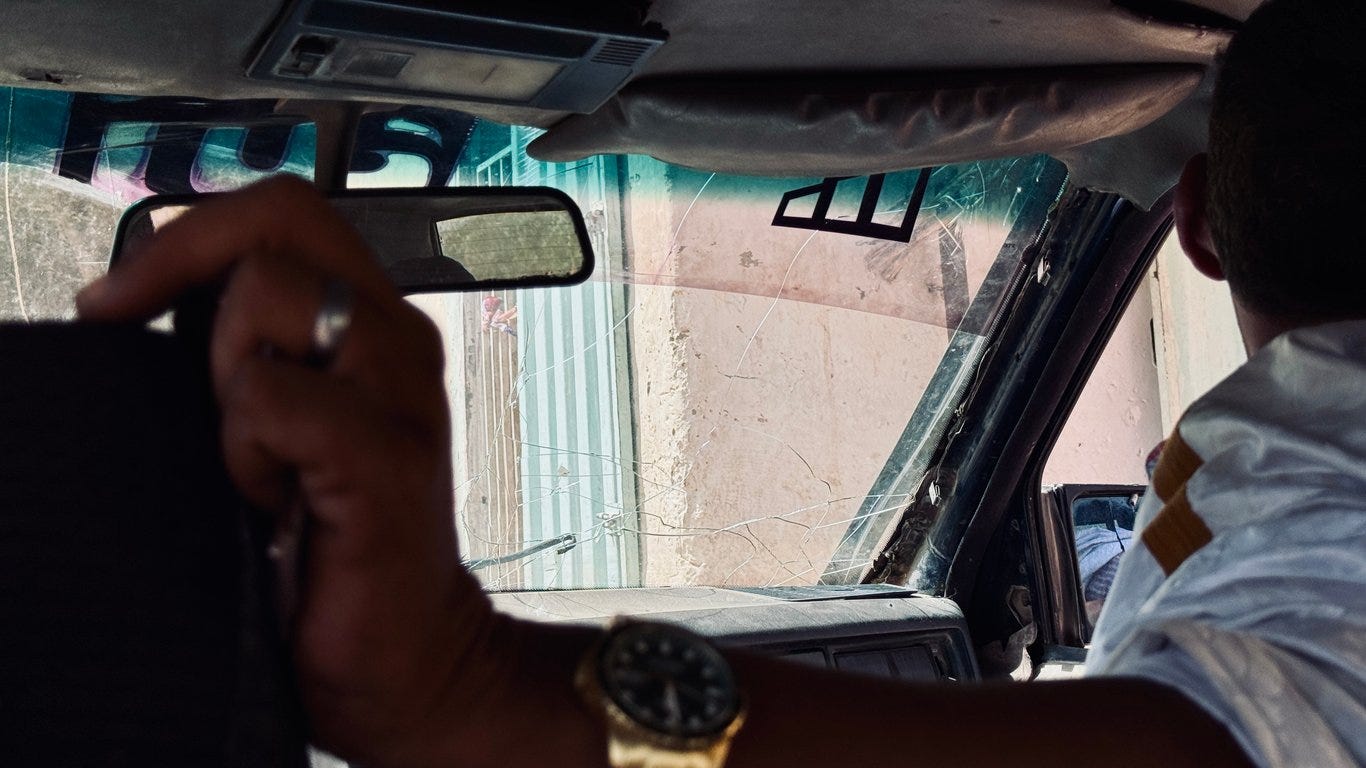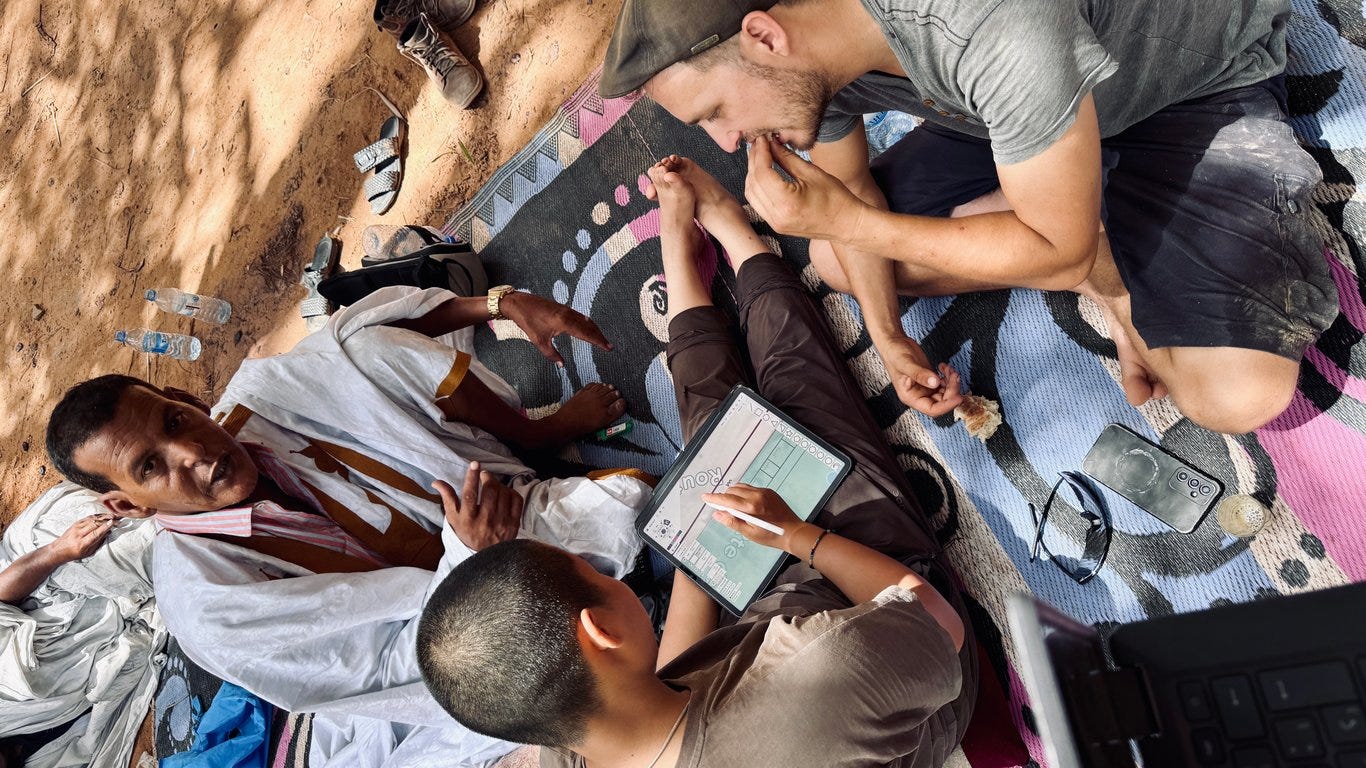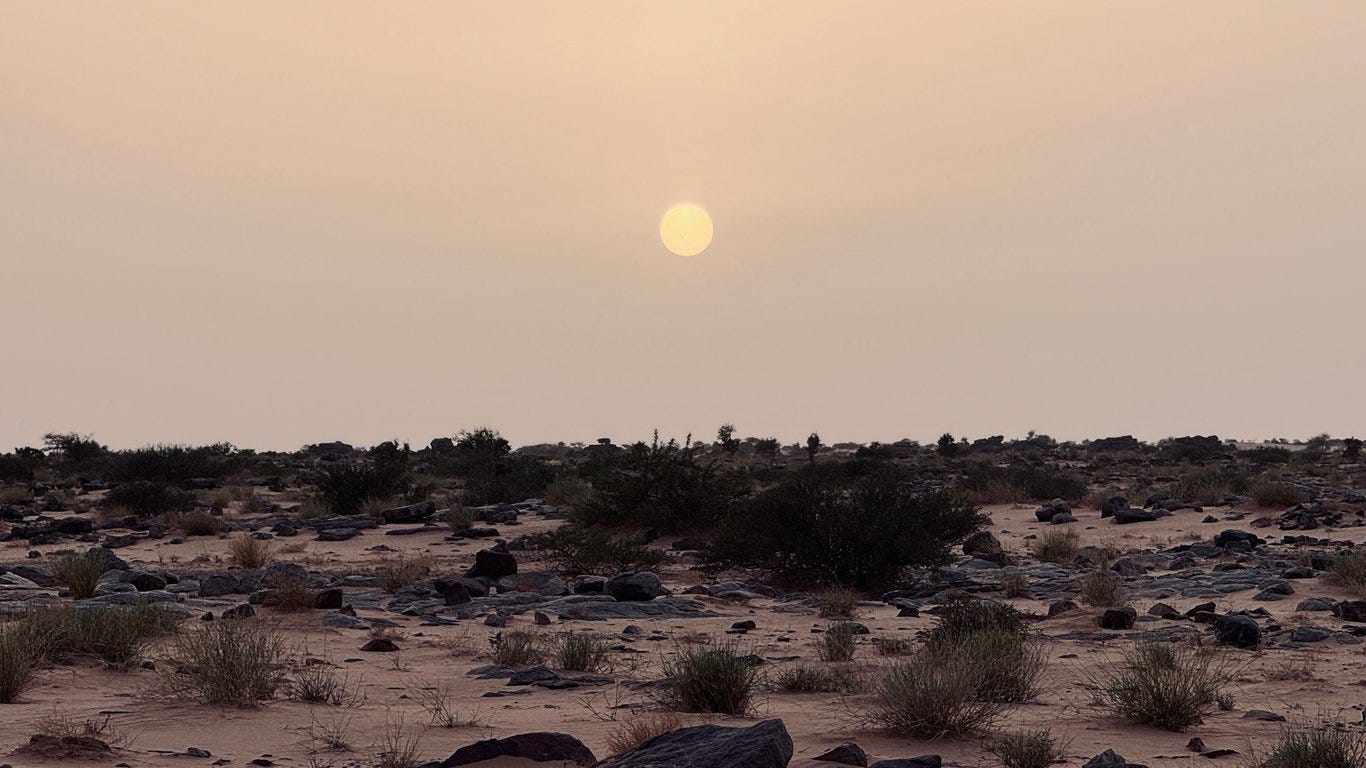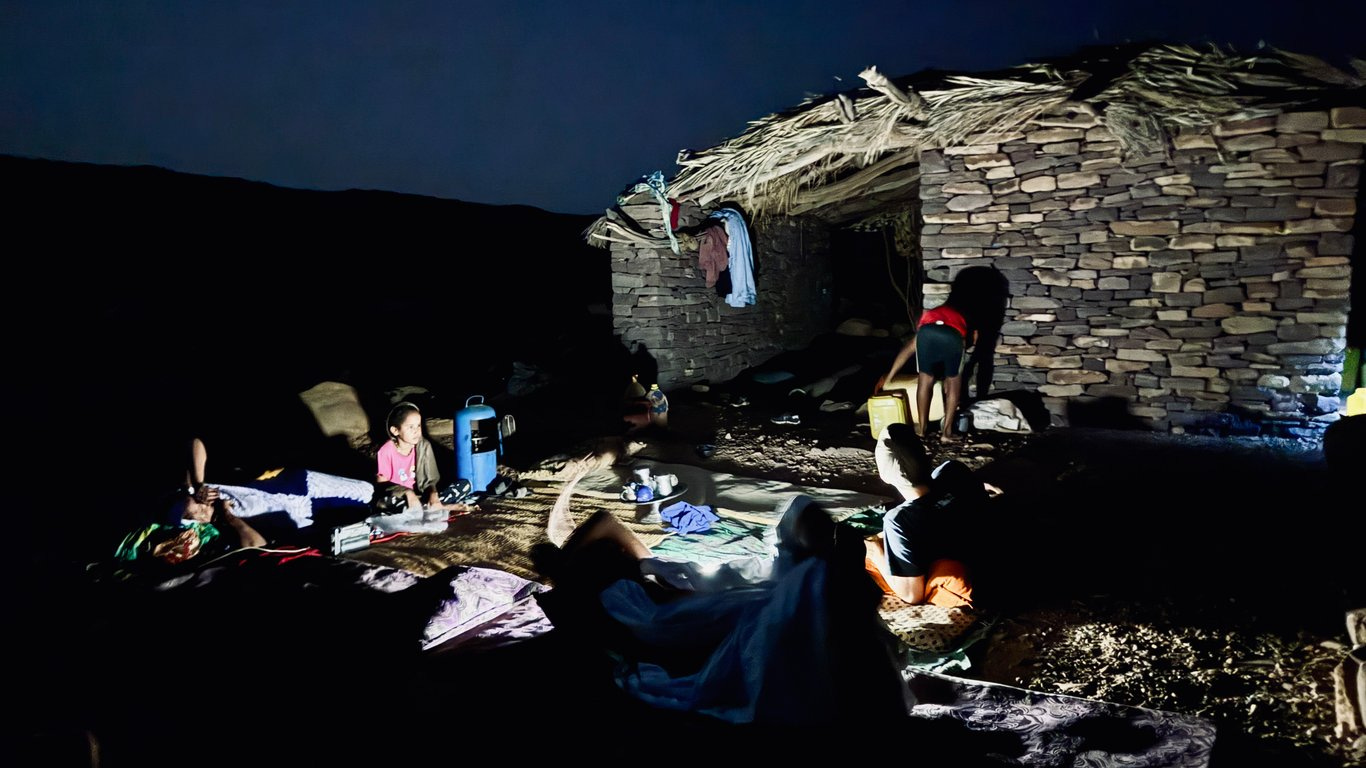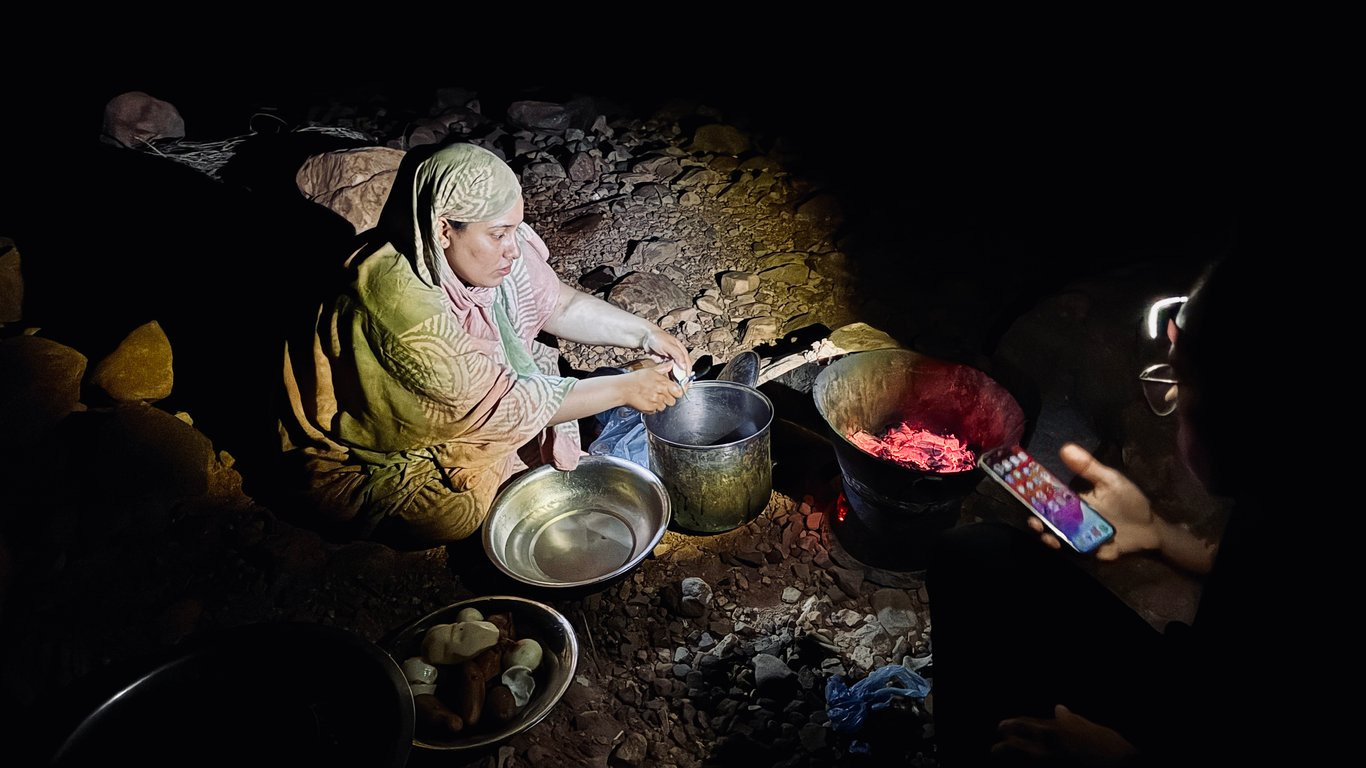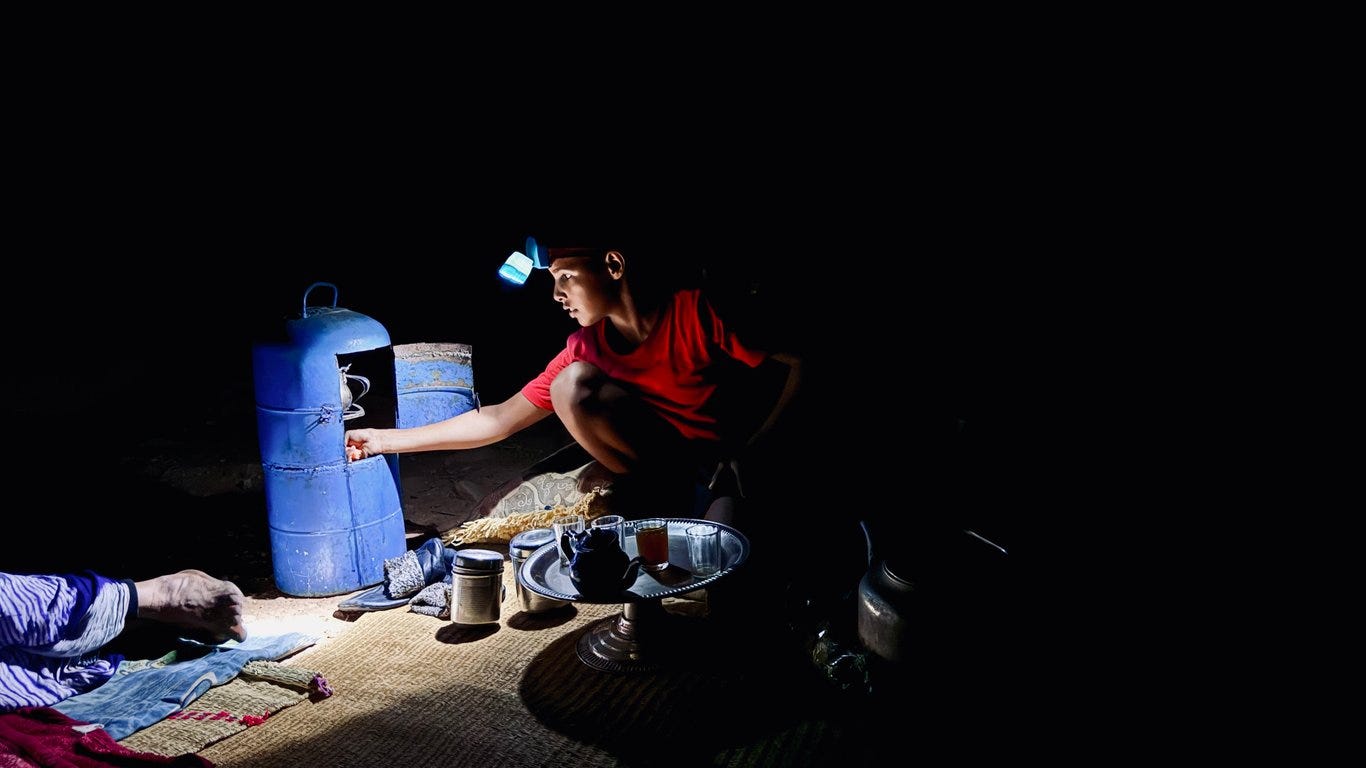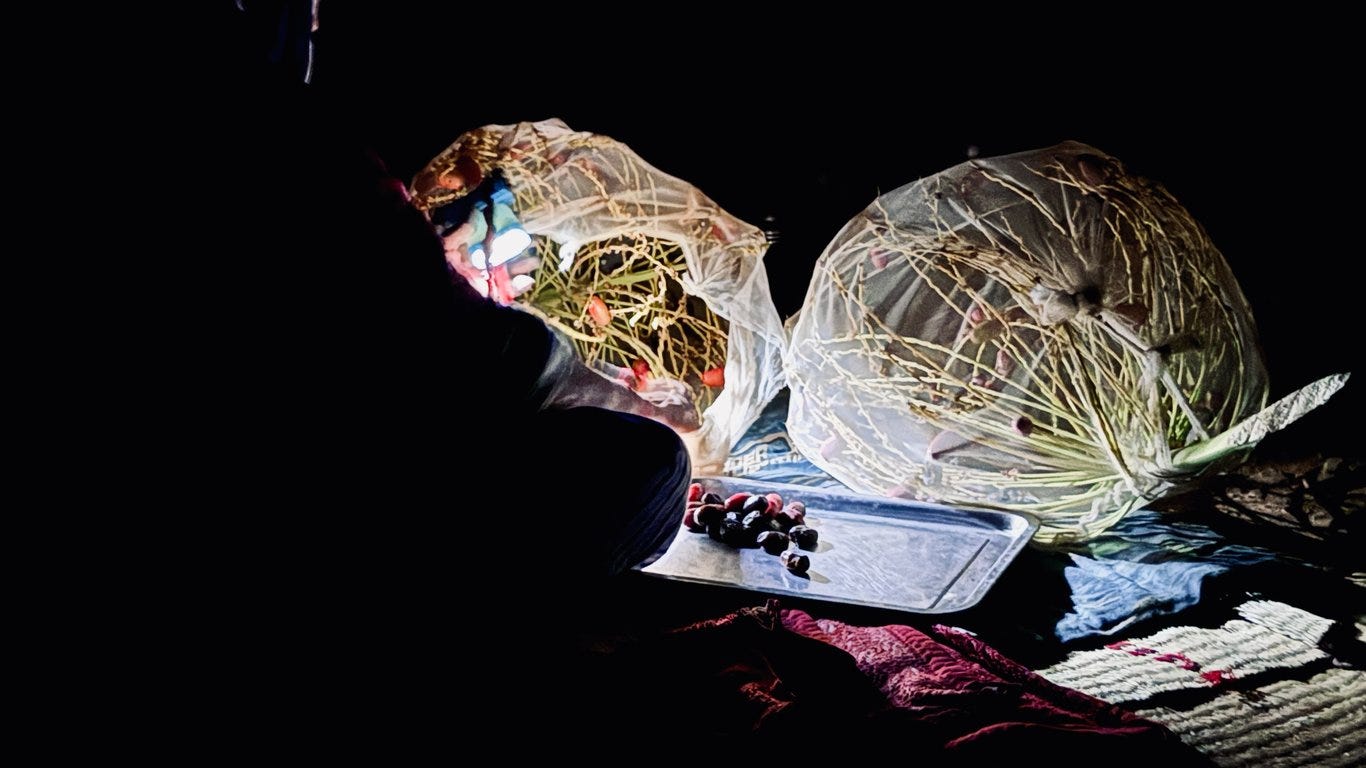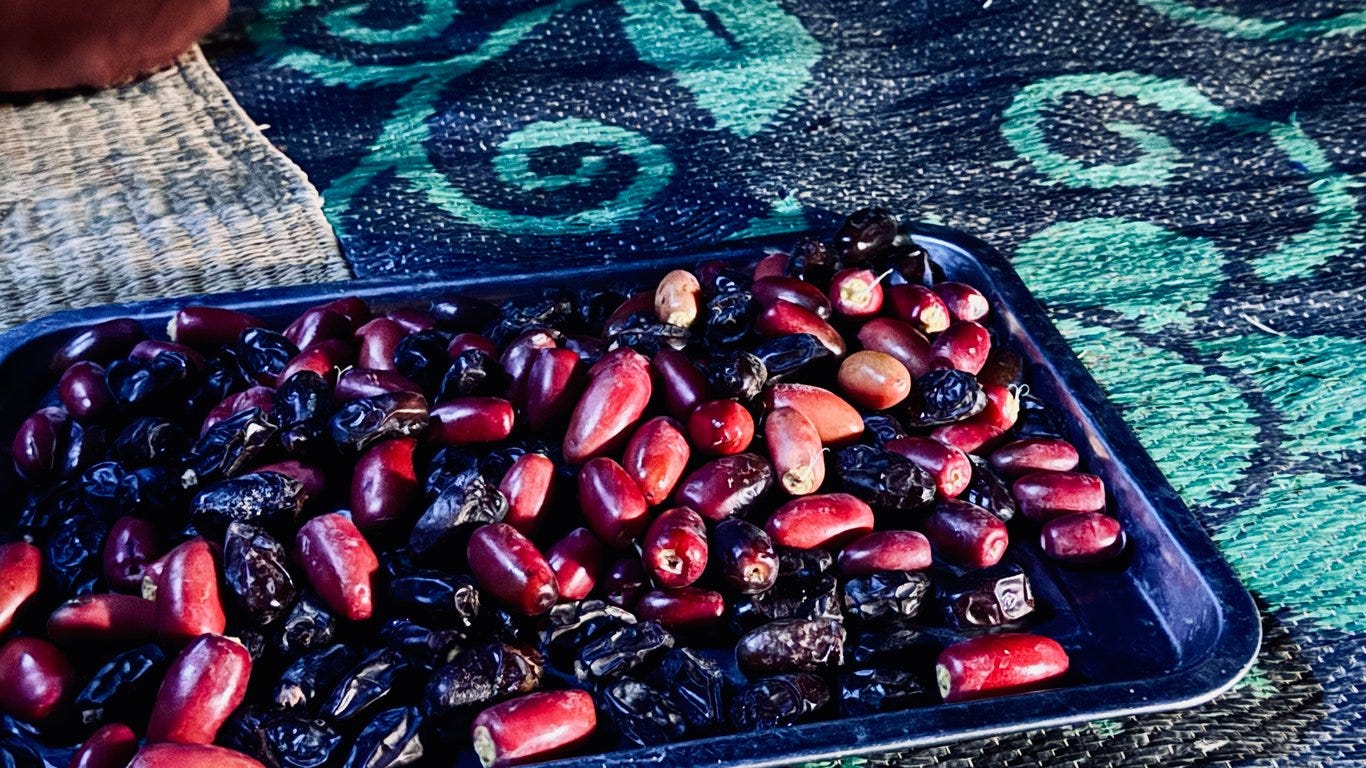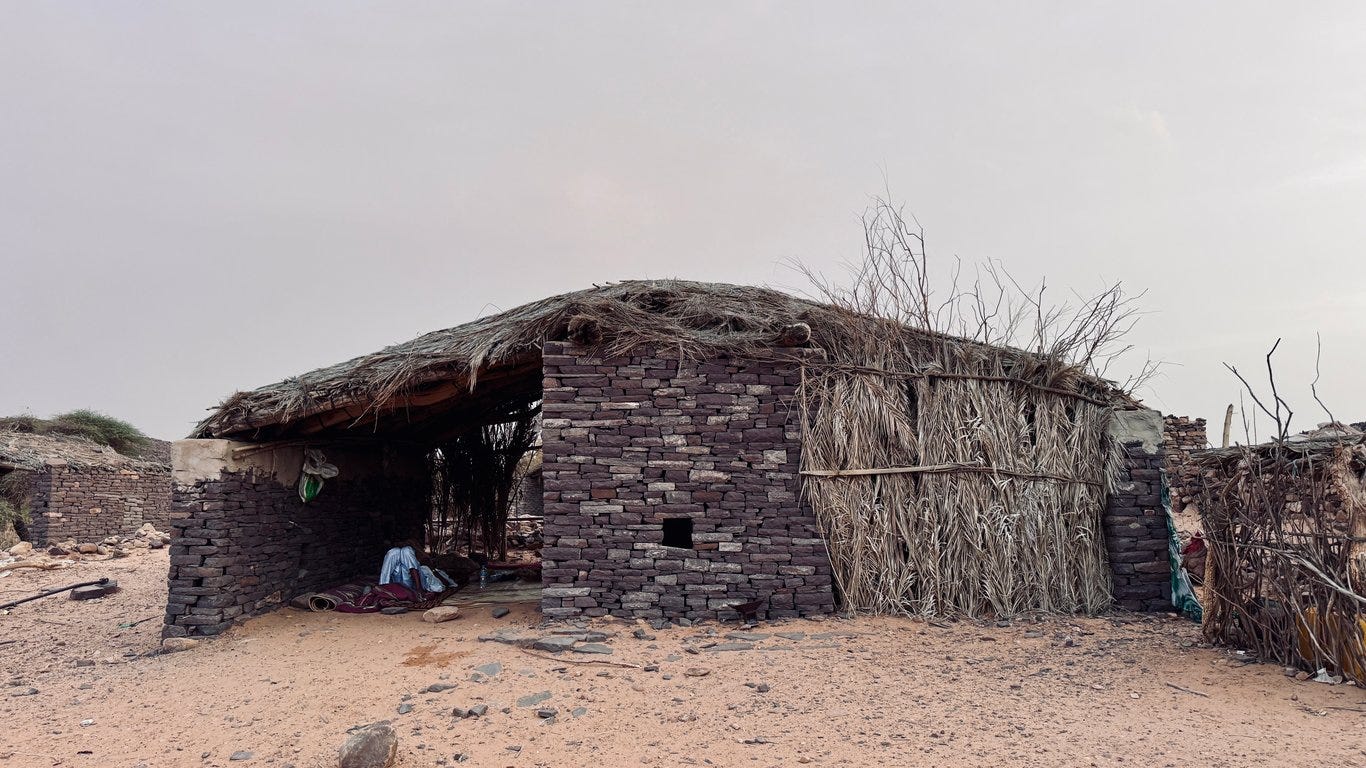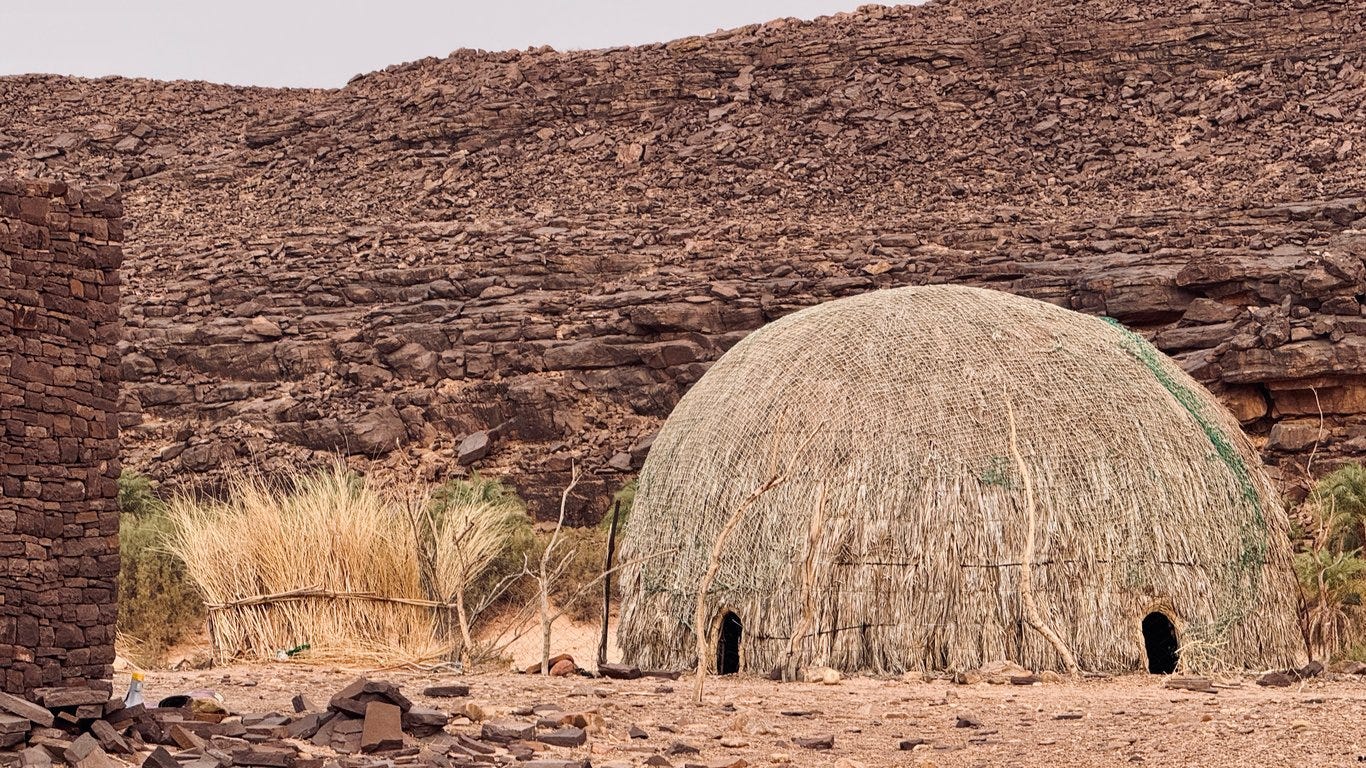The Sun Will Cleanse All Impurities in the Desert" - The Last Nomads of Mauritania (Part 1)
Between nomadic and settled life, the choices reflect Mauritania's social transformation.
Prologue: A White Campervan from France Drives into the Desert from Nouakchott
The decision to venture into the desert was incredibly spontaneous. That evening, while Oumayma and I were planning to head to Senegal the next morning, we met Adrien, a French photographer who had driven from France to Nouadhibou for an art project before crossing the desert to reach the capital. He not only showed us his humanistic photo collection from West Africa taken over a decade ago,
but also recommended photos shared by another photographer – depicting a self-sufficient oasis village in the Mauritanian desert, complete with sustainable agriculture, a hospital, and a school, welcoming all visitors with warm hospitality. Seeing this description, Oumayma and I exchanged knowing glances, smiled, and immediately decided to change our plans – wasn't this exactly the kind of sustainable village we were seeking?
The next day, we made preparations for our desert journey: purchasing Mauritanian SIM cards, making sufficient passport copies, and packing enough provisions. Meanwhile, photographer Adrien made a last-minute decision to join us in visiting the village, offering to drive us in his campervan.
And so, at 6 AM on the third day, one man, one woman, and one non-binary person excitedly embarked on our desert village quest. We departed early not only to avoid the heat but also to pass through the checkpoints before the police awoke – there were simply too many checkpoints near the capital.
Islamic Hospitality
By 2 PM, the outdoor temperature reached 46°C. Crammed in the front of the secondhand campervan without air conditioning or insulation, we were nearly delirious from the heat. Upon reaching a small village along the main road, we unanimously agreed to seek shelter from the heat.
Under curious gazes, a respected elderly villager warmly invited us into his home.
"The Quran teaches us to host guests unconditionally. We're delighted to have visitors like you!" he said.
In this desert nation of Mauritania, a unique tea culture endures. People here have an incredible passion for tea, with some forty-something men drinking up to forty cups daily.
Their tea preparation is distinctive: large amounts of white sugar dissolve in the teapot, and after boiling, the tea is repeatedly poured between three small cups to better incorporate the sugar. When thick foam forms in the cups from the repeated pouring, it signals a perfect brew. Preparing one round of tea takes about 20 minutes, yielding only three small cups, each finished in two sips. Perhaps this is their way of passing the abundant leisure time in the desert. This tea tradition is visible in every Mauritanian household, an indispensable part of daily life.
The green tea they use mostly comes from China. This tradition dates back to the 1860s when Chinese green tea began flowing into North Africa. It all started in 1854 when, due to the Crimean War, British ships bound for the Baltic Sea were forced to dock at Tangier, Morocco. The merchants successfully convinced locals to add green tea to their mint tea, thus beginning this region's unique tea culture. This custom later spread to Mauritania and other Maghreb countries.
In the sweltering heat, I drifted in and out of sleep.
Around 5 PM, when the outdoor temperature finally became bearable, we offered our thanks and blessings to the elderly host's family. A mother gave us a bundle of dates for our journey.
That night, just when we thought we wouldn't meet our host Abdul, a car caught up with us, and Abdul greeted us loudly from the window. We sighed in relief, as we had already encountered eight checkpoints that day, using up eight passport copies; we couldn't handle any more police encounters.
Abdul explained that it was too late to reach his camp tonight, so we would need to spend the night in a nomadic family's village nearby.
First Night Under the Desert Stars
In the pitch-black desert, I vaguely discerned beams of flashlights illuminating several semi-open huts made of palm leaves and mud bricks. A woman was cooking over a pot, guided by flashlight.
Abdul spread a carpet and thin mattresses on the sand, reclined, and began chatting with us. He's the brother of Menne, who had hosted us at the campsite in Nouakchott. Although his family had moved to the city, he preferred desert life. In the family business, he was responsible for building and operating several desert camps for tourists.
Around 10 PM, a plate of dates arrived – the traditional nomadic appetizer. "Dates are very good for health, but only when eaten in odd numbers," Abdul told us. Though I didn't understand the reasoning behind the odd numbers, I happily ate thirteen. Fresh-picked dates were incredibly delicious!
The main course was couscous topped with a broth of lamb, onions, potatoes, and carrots, seasoned simply with water and salt – a stark contrast to heavily spiced Moroccan cuisine. Despite its simplicity, perhaps due to the freshness of the meat, the meal was exquisite. After enduring city junk food, my stomach rejoiced at this meal.
After dinner, while others continued chatting, I, an early sleeper, was already drifting into dreamland. Knowing we'd sleep on this very carpet, I dozed off watching the stars, listening to Abdul preparing tea and conversing.
This sleep unexpectedly carried me straight through to morning. Upon waking, I realized that despite having no pillow, mattress, or blanket, I had slept remarkably well. The softness and warmth of the sand, coupled with the pleasant night temperature, had created perfect conditions for sleeping outdoors.
Looking around at dawn, I noticed that not only our group of four but also the surrounding nomadic families had slept outside on carpets rather than inside the houses.
Having seen nothing in last night's darkness, only when I climbed the dune at dawn did I discover the numerous houses of varying sizes and people still asleep around us.
After practicing yoga and vajra exercises facing away from the sun, the nomadic people gradually awakened. A woman rose to prepare breakfast – they seemed to keep their utensils on the low rooftops.
Breakfast consisted of wheat flour milk served with bread for dipping in honey and olive oil.
As thanks for guiding us through the desert, we agreed to volunteer for Abdul's desert camp business. Adrien would photograph the camps, Oumayma, with her marketing background, would write proposals for sustainable tourism improvements, and I would use my architectural education and permaculture design experience to plan their new camp on an empty plot.
After surveying the construction site, Abdul took us to work on drawings elsewhere—after all, the planned site had neither water nor shade. As we climbed into his assembled vehicle, we couldn't help but notice the precarious state of the windshield, which looked like it might shatter at the slightest touch.
The oasis exceeded our expectations of a paradise. Surrounded by streams and dense palm trees, the desert's scorching heat seemed non-existent here (please refer to the video clip for this scene). Despite several families resting here, the spring water wasn't cool enough to entice anyone for a swim.
For lunch at the oasis, the five of us shared several lamb legs. I worked on my drawings using my iPad until its battery died.
As we waited for what seemed like an eternity in the oasis, Abdul showed no signs of wanting to leave and eventually dozed off. Not wanting to leave without him, we began playing word chain games in English to pass the time—interestingly, none of the three players were native English speakers.
After Abdul finally awoke and unhurriedly prepared another pot of tea, we finally left the oasis.
Half-nomadic family
In the evening, we arrived at a settlement nestled between canyons. The entire village was wrapped in darkness. Guided by flashlights, we climbed over massive rocks to meet a semi-nomadic family who now lives in Nouadhibou but returns to the desert during summer. Only the mother, children, and grandmother were present, with no adult male in sight—presumably, he remained at their city home.
Mauritania's urbanization came late; the capital Nouakchott was just a quiet fishing village in 1958. After gaining independence from France in 1960, Nouakchott was chosen as the capital and underwent an astonishing transformation through urbanization.
The nomadic peoples who once roamed the desert are now experiencing a transformation in their way of life. As modernization sweeps through, some have chosen urban prosperity, leaving behind vacant desert dwellings.
Nevertheless, the nomadic lifestyle remains deeply rooted in people's hearts. Many are adopting a new way of life—semi-nomadic and semi-settled, just like this family. Currently in the date harvest season, this family has returned to the desert to collect dates for selling in the city.
Interestingly, in nomadic culture, people believe that the sun and desert winds purify everything, keeping the earth in its most pristine state. This belief led to a cultural practice—leaving waste in the desert, trusting nature to clean it up. Of course, in the past, people only used biodegradable natural materials, but things are different now.
Many young people living in Mauritanian cities today are second-generation urban dwellers, though most still come from nomadic families who migrated from desert villages. This deeply ingrained desert nomadic lifestyle has led to serious environmental challenges—plastic waste litters the streets, and few people have developed habits of cleaning and tidying. These behavioral patterns, inherited from nomadic culture, have created significant hygiene issues in the urban environment.
However, in the desert itself, we saw no visible traces of garbage. Though we knew that much plastic waste likely lay buried beneath the sand dunes.
The sister in charge of dinner preparation got along wonderfully with Oumayma. Under the beam of flashlights, the two chatted happily while chopping onions, carrots, and eggplants, watching the pot bubble away on the gas stove.
I never tired of watching the young boy's masterful tea-making skills as he tirelessly prepared pot after pot of Mauritanian tea for everyone (please refer to the video clip for this scene).
Another sister was picking dates and gassoul from the collected palm fronds. In Mauritania, the light red fruit that grows on the same palm tree as dates is called "ghassoul" or "gassoul." This fruit, which comes from the date palm, is smaller and lighter in color than the well-known dates.
Unlike the intensely sweet dates, gassoul starts with a subtle sweetness before giving way to an astringent taste. Both fruits leave you feeling thirsty afterward.
When dinner was ready, the extended family gathered around with us. There were no spoons tonight; everyone ate couscous in the traditional nomadic way—grabbing a handful, rolling it in your palm to form a ball, and eating it in one bite. Unfortunately, as novices to this technique, we scattered couscous everywhere. Moreover, while everyone else seemed immune to the heat, I was rolling around trying to cool my burning hands.
After dinner, everyone gathered in the small square at the center of the settlement, spreading out blankets to play games with Sig sticks (more on this later). Being the first day of my period, I was incredibly tired and somehow fell asleep at the edge of the blanket while the entire village was still chatting and laughing loudly.
At two in the morning, I suddenly awoke to complete darkness, hearing only the whistling of wind over sand and low thunder in the cloudy sky. Turning on my headlamp, I looked around to find myself alone. The large blanket that had fit the entire village was now rolled up beside me, and someone had thoughtfully left me a mattress pad (please look for this scene in the video).
"Really? Everyone's sleeping somewhere else, leaving me alone in the middle of a circle of empty houses?" I shuddered, "Am I being sacrificed? Am I some offering for rain?"
Though I'd grown accustomed to sleeping outdoors without covers, I still preferred to sleep somewhere less exposed. I got up to search for where everyone else was sleeping.
Feeling my way along the rocks in the darkness, I found Adrien and Abdul sleeping near the car, and Oumayma and the girls on the dinner blanket. Of all nights, they'd separated by gender—were they accommodating me as non-binary by giving me the entire square to myself?
Just as I was debating whether to return to the square, it actually started raining. Goodness, rain in the desert! Perhaps my role as a sacrificial offering worked after all!
I noticed Abdul groggily rolling up the carpet and moving it into a larger house beside the square. I followed suit, bringing my mattress into the same house and sleeping until dawn.
Houses as shared resources
Once again, I seemed to be the earliest riser. In the morning, I wandered among the empty houses in the canyon, reflecting on what Abdul had told us.
In Mauritania's vast desert, nomadic peoples have a very different concept of housing than city dwellers.
The government maintains an open policy toward desert housing construction, allowing citizens to build homes wherever they choose. There's no complex property documentation or approval process needed. Those who build the houses naturally gain residence rights through their labor and investment. However, this ownership is fluid and open: when the house's builders move elsewhere in their nomadic cycle, others may occupy the vacant house and are granted implicit residence rights. Yet if the original builders return, current occupants must vacate.
Perhaps due to the nomadic people's inherent openness, Islamic influences, or simply because the semi-settled era has left too many vacant houses in the desert, this unique nomadic dwelling culture rarely leads to disputes—people generally consider it pointless to quarrel over a dwelling place.
In this vast desert, houses aren't symbols of private property but rather shared resources, demonstrating a wisdom that transcends modern property concepts.
At some point, a woman awoke to milk the goats; soon after, children appeared in the settlement, curiously watching me wander through the canyon.
Oumayma also woke up; apparently, she and the sister hadn't even sought shelter from the rain during the night.
After the girl woke up, she played with us. Far from shy, she confidently and cleverly showed me around the village.
Before leaving, the sister was especially reluctant to part with Oumayma—they had formed a deep friendship in just one evening. After countless hugs, the family held our hands as they watched us leave the canyon.
Between desert nomadism and urban settlement, Mauritanians are experiencing a choice in lifestyles. However, in the vast desert, there are still many families maintaining traditional nomadic life.
"Roaming freely in the desert every day, spreading a carpet in the wilderness or in some village, smoking a cigarette, drinking tea, and falling asleep under the stars—this is the lifestyle I don't want to change," Abdul told us. They deeply cherish this free sky, continuing their ancestors' wisdom among the rolling dunes. For these families, nomadism isn't just a way of survival; it's an spiritual anchor they can't bear to abandon. And tomorrow, we would visit just such a family.
(To be continued)

